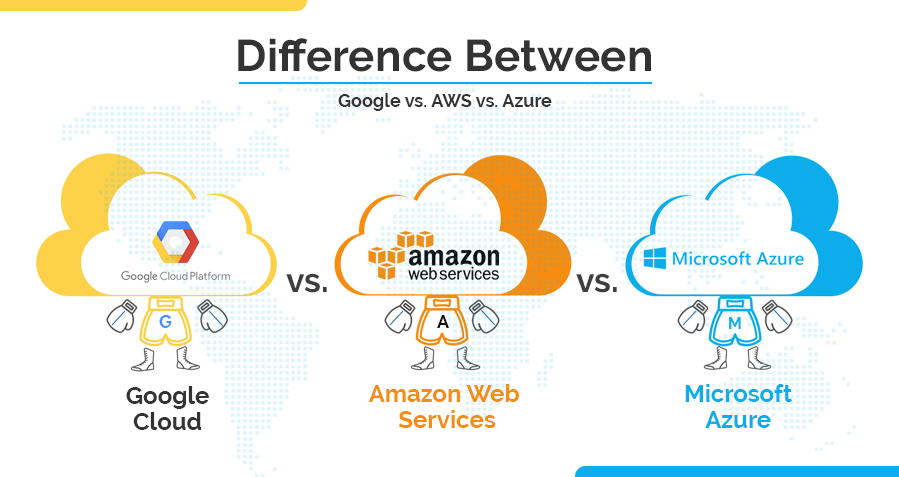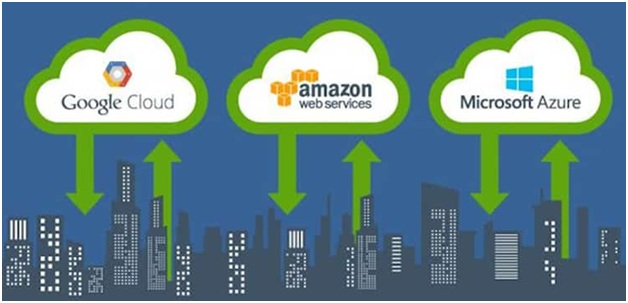Hey everyone, Today we’ll discuss Difference Between Google Cloud Azure and AWS in deep.
Gartner, the world’s leading research firm, has issued research which explains the market position of all current Cloud IaaS providers:
- AWS commands the cloud space with the appropriate combination of tools in a single platform
- Microsoft Azure follows, which requires an impactful accomplishment that AWS has.
- Google Cloud is showing signs that it could be an excellent cloud provider and is gaining recognition.
A principal concern for businesses is to partner up with a stable cloud service provider. You must know of the ongoing tight match amongst the two tech giants Microsoft Azure and Amazon Web Service (AWS) to rule the cloud market. As Google is new to the cloud, today it is quite behind in this competition. If we examine the prevailing industry trends, it is quite tight to make an informed choice out of the cloud platforms.

Let’s take a look at which cloud platform is best for your business by examining all apparent features. And have a look below Difference Between Google Cloud Azure and AWS.
Storage:
AWS grants temporary storage that starts working along with the case. Once the situation is over, it’s no longer there. It also gives Block Storage that is comparable to hard disks. The Block Storage can be either kept separate or attached to any instance. Also, it provides objects storage with S3 services and archiving services with Glacier.
Microsoft Azure utilizes temporary storage for VM based columns and Page Blobs. Files and Block Blobs server for Object Storage.
Database:
AWS entirely carries relational databases, NoSQL and Big Data as well.
Concerning databases, Azure supports relational databases, NoSQL databases, and Big Data through Windows Azure Table and HDInsight.
Compute:
EC2 is the prime offering of AWS in computing. EC2 renders a wide range of options to facilitate users with customized offerings. Other computing services of AWS contains AWS Auto-scaling, EC2 Container Service, and Lambda as well as Elastic Beanstalk for app deployment.
Azure compute relies on its Virtual Machines that are attached to other tools such as Cloud Services and Resource Manager to expand applications on the cloud platform.
Networking:
Amazon’s Virtual Private Cloud (VPCs) and Azure Virtual Network (VNET) grant users to group Virtual Machines into isolated networks in the cloud. Users can create subnets, classify the private IP address range, network gateways, and network topology. Both the cloud platforms offer advanced solutions to increase your on-premise data center into a public or Hybrid cloud.
Security:
Amazon ensures users to have improved privacy and more controls at less the price. Main advantages of employing AWS are:
- Solution Scalability and Quick Application
- Keep All Your Data Safe
- Save Costs
- Meet Compliance Requirements
There are five layers of Azure security such as application, data, host, physical, and network. Azure infrastructure protects the Azure ecosystem from all vulnerabilities. For the user’s data security, Microsoft offers multiple services such as:
- Securing Networks
- Encrypting operation and communication process
- Controlling and managing user access and identity
- Managing Threats
Client Base:
When compared to AWS, Microsoft has less high profile customers (Difference Between Google Cloud Azure and AWS). It holds proper credit for SaaS tools. Microsoft has a few notable clients including Heineken, Pearson, 3M, NBC News, GE healthcare, Ford and many more.
Conclusion:
So, the Conclusion of Difference Between Google Cloud Azure and AWS below!
As AWS offers exclusive functionalities, it is known as the most experienced cloud platform. It is leading the cloud market because of its multi-layer offerings. Services and tools implemented by AWS cost more, but their enterprise-friendly features make a strong proposition for large-scale companies.
Microsoft Azure is a better choice for a Hybrid approach. They are also committed to their promises and what they are offering right now.
We hope this helps. All the best and happy learning!

